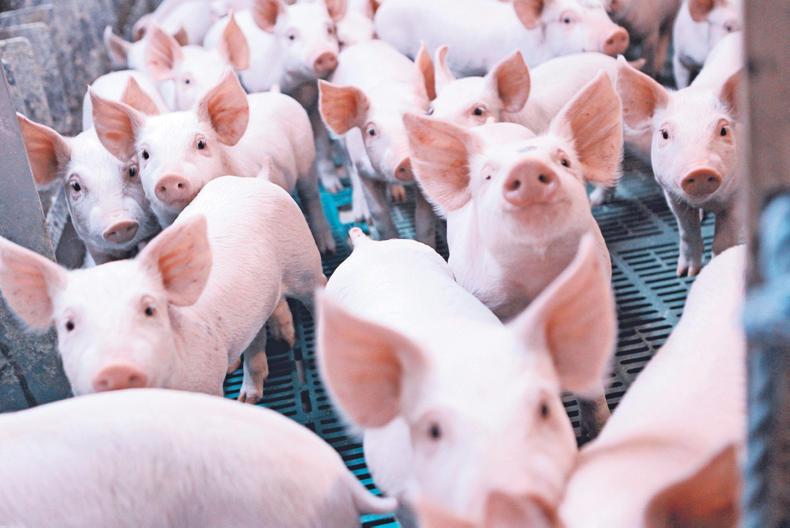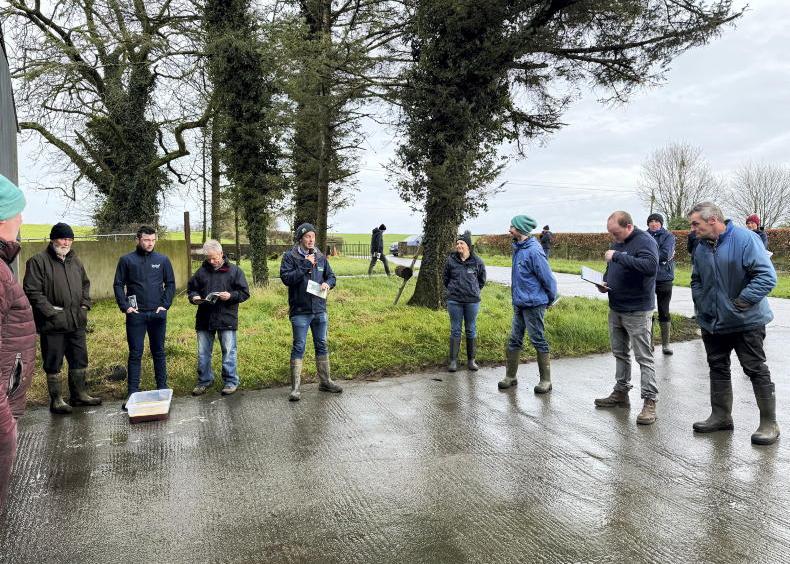Many are already familar with African swine fever (ASF) and its impact on pig prices around the world. But what is it, are we at risk in Ireland and what can we do about it?
At present, the disease is mainly affecting pig herds in China, Vietnam and other countries throughout East and Southeast Asia, but it is also occuring much closer to home, spreading throughout wild boar populations in Hungary, Romania, Bulgaria and Sardinia, with an isolated case occuring in Belgium in 2018. The latest European worry is its presence in Poland, very close to the German border.
What is ASF?
ASF is a devastating virus and one of the most important and serious diseases in domestic pigs. It is a notifiable disease, which means that you are legally obliged to report any suspected case to the relevant authorities. There is no treatment or vaccine available to control it and it causes mortality rates approaching 100%.
Acute disease can result in the sudden death of animals
Clinical signs range from mild to severe, depending mainly on the virulence of the virus. Acute disease can result in the sudden death of animals, high fever (40.5-42°C), reddening of the skin, tips of ears, tail, chest and abdomen.
It can also result in decreased appetite, listlessness, incoordination within 24-48 hours before death, vomiting, diarrhoea (sometimes bloody) and eye discharges, death within six to thirteen days, or up to 20 days and abortion. The main routes of transmission of the virus are:
Contact with infected pigs and wild boar or their faeces, urine or bodily fluids.Ingestion of infected pork or pork products by pigs e.g. food waste containing salami, sausages, etc. Contact with contaminated vehicles, clothing, footwear, equipment.The use of infected reproductive material e.g. semen.Biological vectors - ticks of the species Ornithodoros (vector species not present in Ireland).The virus survives well at low temperatures. It can survive in chilled and cured meats for months and in frozen meat for several years.
Cooking meat at 70°C for 30 minutes will inactivate the virus (it is not a human food safety issue).
Illegal feeding of food waste containing or contaminated by infected meat is suspected of causing a number of outbreaks.
Wild boar have played an important role in the transmission of the virus to domestic pigs through direct contact, particularly in small holdings with low levels of biosecurity.
What can we do in Ireland?
Vigilance is key to preventing it from entering our country. Adherence to strict biosecurity measures is a must.
ASF can survive for a long time in pigmeat and can spread easily to pigs by feeding them food waste.
Dispose of leftover food carefully and away from pigs
This is possibly the biggest threat to the Irish herd. Do not bring food containing pork or pork products on to a pig farm.
Dispose of leftover food carefully and away from pigs.
Upon your return to Ireland, avoid contact with pigs for at least 72 hours
Do not bring meat or meat products from pigs or wild boar into Ireland if you are travelling to regions of the EU or Asia where ASF is present.
Upon your return to Ireland, avoid contact with pigs for at least 72 hours if you have visited pig farms in infected or high risk areas.
For farm workers who may travel abroad to areas affected by ASF, it is equally important to understand the risks associated with ASF and precautions you can take to avoid inadvertently bringing it into Ireland, including:
Avoiding any pig contact while away from Ireland.Wild boar hunting is a significant leisure pursuit in many European countries. We would advise that pig workers would desist from partaking in wild boar hunting for the time being.Clothing and footwear are major vectors of ASF. Any footwear that may have been worn while away should be properly cleaned and disinfected and preferably not worn to work on return to Ireland.Avoid returning to work on pig farms for three days after returning to Ireland. Pork products and salami-type meats are major vectors of ASF. Never bring foreign meats back to Ireland and never bring them in sandwiches or lunches on to pig farms.Prevention
As there is no treatment or vaccine for ASF, the only way to keep the virus out of your herd is through adoption of strict biosecurity measures, especially external biosecurity. Work with your vet and farm staff to develop a biosecurity plan for your farm.
Use the BioCheck biosecurity scoring tool (introduced to Ireland by Teagasc) to score your farm and highlight weaknesses to be addressed.
This is now funded by Animal Health Ireland via your vet. If you haven’t used it for your farm, do so now.
Education and vigilance is critical. Farm staff and visitors must be well informed about ASF. Create an awareness of the importance of good biosecurity on your farm. Explain what ASF is, how it spreads, the risks associated, and the consequences it would have for your business. Regularly review and update the plan.
General biosecurity
recommendations
Build a perimeter fence to prevent vehicle and wildlife entry.Access gates should be closed. Erect a sign with a contact number to gain access.Provide disinfectant wheelwash and footbath facilities at the fenceline (and ensure that they are replenished regularly).Keep visitor access to a minimum and require a “clean time” (ideally 72 hours) between farms.Provide shower facilities, clean clothing and boots.Operate the following from outside the perimeter fence: filling feed bins, loading pigs, manure removal, dead pig removal and general deliveries. Ideally, farms should have their own dedicated transport. Trucks must be washed and disinfected prior to arrival and be given a minimum 24 hour rest period after factory deliveries. Trucks should be washed and disinfected before leaving the slaughter facility.Request vet reports for incoming stock (and AI) and quarantine stock for four to eight weeks off-site.Ensure good rodent and bird control.Routine hygiene: wash, dry, disinfect and allow pens to dry again before refilling. Arrange pig flow to avoid contact between young pigs and older animals. Cover dead pig skips. Keep the area clean and empty regularly. Have washing and disinfection facilities for boots and hands at key locations around the farm (junction between different sections). Read more
African swine fever reaches Greece
Coming home for Christmas? Don’t bring African swine fever with you
Many are already familar with African swine fever (ASF) and its impact on pig prices around the world. But what is it, are we at risk in Ireland and what can we do about it?
At present, the disease is mainly affecting pig herds in China, Vietnam and other countries throughout East and Southeast Asia, but it is also occuring much closer to home, spreading throughout wild boar populations in Hungary, Romania, Bulgaria and Sardinia, with an isolated case occuring in Belgium in 2018. The latest European worry is its presence in Poland, very close to the German border.
What is ASF?
ASF is a devastating virus and one of the most important and serious diseases in domestic pigs. It is a notifiable disease, which means that you are legally obliged to report any suspected case to the relevant authorities. There is no treatment or vaccine available to control it and it causes mortality rates approaching 100%.
Acute disease can result in the sudden death of animals
Clinical signs range from mild to severe, depending mainly on the virulence of the virus. Acute disease can result in the sudden death of animals, high fever (40.5-42°C), reddening of the skin, tips of ears, tail, chest and abdomen.
It can also result in decreased appetite, listlessness, incoordination within 24-48 hours before death, vomiting, diarrhoea (sometimes bloody) and eye discharges, death within six to thirteen days, or up to 20 days and abortion. The main routes of transmission of the virus are:
Contact with infected pigs and wild boar or their faeces, urine or bodily fluids.Ingestion of infected pork or pork products by pigs e.g. food waste containing salami, sausages, etc. Contact with contaminated vehicles, clothing, footwear, equipment.The use of infected reproductive material e.g. semen.Biological vectors - ticks of the species Ornithodoros (vector species not present in Ireland).The virus survives well at low temperatures. It can survive in chilled and cured meats for months and in frozen meat for several years.
Cooking meat at 70°C for 30 minutes will inactivate the virus (it is not a human food safety issue).
Illegal feeding of food waste containing or contaminated by infected meat is suspected of causing a number of outbreaks.
Wild boar have played an important role in the transmission of the virus to domestic pigs through direct contact, particularly in small holdings with low levels of biosecurity.
What can we do in Ireland?
Vigilance is key to preventing it from entering our country. Adherence to strict biosecurity measures is a must.
ASF can survive for a long time in pigmeat and can spread easily to pigs by feeding them food waste.
Dispose of leftover food carefully and away from pigs
This is possibly the biggest threat to the Irish herd. Do not bring food containing pork or pork products on to a pig farm.
Dispose of leftover food carefully and away from pigs.
Upon your return to Ireland, avoid contact with pigs for at least 72 hours
Do not bring meat or meat products from pigs or wild boar into Ireland if you are travelling to regions of the EU or Asia where ASF is present.
Upon your return to Ireland, avoid contact with pigs for at least 72 hours if you have visited pig farms in infected or high risk areas.
For farm workers who may travel abroad to areas affected by ASF, it is equally important to understand the risks associated with ASF and precautions you can take to avoid inadvertently bringing it into Ireland, including:
Avoiding any pig contact while away from Ireland.Wild boar hunting is a significant leisure pursuit in many European countries. We would advise that pig workers would desist from partaking in wild boar hunting for the time being.Clothing and footwear are major vectors of ASF. Any footwear that may have been worn while away should be properly cleaned and disinfected and preferably not worn to work on return to Ireland.Avoid returning to work on pig farms for three days after returning to Ireland. Pork products and salami-type meats are major vectors of ASF. Never bring foreign meats back to Ireland and never bring them in sandwiches or lunches on to pig farms.Prevention
As there is no treatment or vaccine for ASF, the only way to keep the virus out of your herd is through adoption of strict biosecurity measures, especially external biosecurity. Work with your vet and farm staff to develop a biosecurity plan for your farm.
Use the BioCheck biosecurity scoring tool (introduced to Ireland by Teagasc) to score your farm and highlight weaknesses to be addressed.
This is now funded by Animal Health Ireland via your vet. If you haven’t used it for your farm, do so now.
Education and vigilance is critical. Farm staff and visitors must be well informed about ASF. Create an awareness of the importance of good biosecurity on your farm. Explain what ASF is, how it spreads, the risks associated, and the consequences it would have for your business. Regularly review and update the plan.
General biosecurity
recommendations
Build a perimeter fence to prevent vehicle and wildlife entry.Access gates should be closed. Erect a sign with a contact number to gain access.Provide disinfectant wheelwash and footbath facilities at the fenceline (and ensure that they are replenished regularly).Keep visitor access to a minimum and require a “clean time” (ideally 72 hours) between farms.Provide shower facilities, clean clothing and boots.Operate the following from outside the perimeter fence: filling feed bins, loading pigs, manure removal, dead pig removal and general deliveries. Ideally, farms should have their own dedicated transport. Trucks must be washed and disinfected prior to arrival and be given a minimum 24 hour rest period after factory deliveries. Trucks should be washed and disinfected before leaving the slaughter facility.Request vet reports for incoming stock (and AI) and quarantine stock for four to eight weeks off-site.Ensure good rodent and bird control.Routine hygiene: wash, dry, disinfect and allow pens to dry again before refilling. Arrange pig flow to avoid contact between young pigs and older animals. Cover dead pig skips. Keep the area clean and empty regularly. Have washing and disinfection facilities for boots and hands at key locations around the farm (junction between different sections). Read more
African swine fever reaches Greece
Coming home for Christmas? Don’t bring African swine fever with you










SHARING OPTIONS